Mikko Tuhkanen
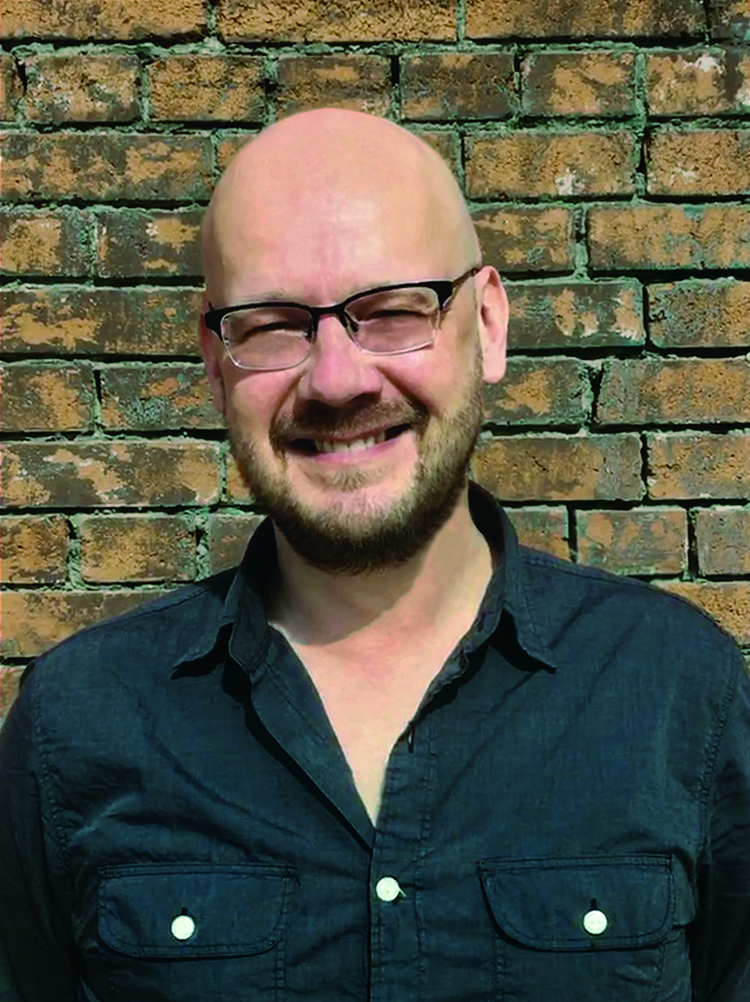
- Areas of Speciality
-
- Theory
- Transnational Literatures
- Race and Ethnicity Studies
- African American and African Diaspora Literature
- Gender and Sexuality
- 20th-Century American
- Comparative Literature
- Contact
-
- (979) 845-8327
- mikko.tuhkanen@tamu.edu
- LAAH 471
- Professional Links
Education
PhD, Comparative Literature, University at Buffalo (SUNY), 2005
PhD, English, University of Tampere, Finland, 2000
MA, English, University of Tampere, Finland, 1994
Bio
Mikko Tuhkanen is Professor of English at Texas A&M University, where teaches African American and African-diasporic literatures, LGBTQ+ literatures, and literary theory. He is the author of, among other books, The American Optic: Psychoanalysis, Critical Race Theory, and Richard Wright (2008) and The Essentialist Villain: On Leo Bersani (2018). He is the editor of Leo Bersani: Queer Theory and Beyond (2014) and Fascination and Cinema, a special issue of Postmodern Culture (2020); as well as the coeditor, with E. L. McCallum, of The Cambridge History of Gay and Lesbian Literature (2014) and Queer Times, Queer Becomings (2011). His other publications include essays in James Baldwin Review, PMLA, diacritics, differences, Modern Fiction Studies, American Literature, and elsewhere. He is currently finishing two book-length studies: “Time’s Witness: On James Baldwin” and “Some Speculation: Thinking with Pet Shop Boys.”
Research Interests
Dr. Tuhkanen’s Scholars@TAMU Profile
- Late 19th/early 20th-century American literature
- African American literature and its transnational contexts
- Literary theory, particularly queer theory
Publications
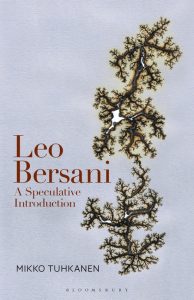 Mikko Tuhkanen. Leo Bersani: A Speculative Introduction. London: Bloomsbury, 2020.
Mikko Tuhkanen. Leo Bersani: A Speculative Introduction. London: Bloomsbury, 2020.
For the past 60 years, Leo Bersani has inspired, resisted, guided, and challenged scholarly work in the fields of literary criticism, queer theory, cultural studies, psychoanalytic theory, and film and visual studies. Moving across an impressive range of sources, Mikko Tuhkanen seeks out the “fundamental notes”-the questions that we find and refind-in Bersani’s extensive oeuvre across the decades.
The chapters explore Bersani’s engagement with psychoanalytic theory (Freud, Laplanche, Klein, Lacan), French and American modernist fiction (Proust, Baudelaire, Mallarmé, James, Beckett), poststructuralist theory (Derrida, Foucault, Deleuze, Guattari, Blanchot), queer theory (Butler, Edelman), and the visual arts (Caravaggio, Almodóvar, Pasolini, Malick, Dumont). This first introduction to Bersani’s work provides a chronological overview of his thought and details his contributions to literary studies and critical theory.
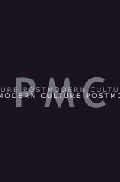 “Fascination and Cinema,” special issue of Postmodern Culture, ed. Mikko Tuhkanen 30.2 (Jan. 2020)
“Fascination and Cinema,” special issue of Postmodern Culture, ed. Mikko Tuhkanen 30.2 (Jan. 2020)
This issue includes the following works:
- Introduction: “The Most Fascinating Medium,” Mikko Tuhkanen, Guest Editor
- “The Violence of a Fascination with* a Visible Form (on Martyrs, Cruetly, Horror, Ethics) [*on and vs. with vs. as],” Eugenie Brinkema
- “A Moving Which Is Not A Moving: Michael Snow’s Wavelength,” E. L. McCallum
- “Circuits of Fascination and Inspiration: Blanchot, Bellour, Grandrieux,” Calum Watt
- “Accompanying Images: Leo Bersani and Cinematic Fascination,” Mikko Tuhkanen
- “The Power of Absolute Nothing: Psycho-Sexual Fascination and Sadomasichism in Secretary,” Kwasu D. Tembo
- “What We Don’t See in What We See: A Response to Fascination and Cinema,” Ackbar Abbas
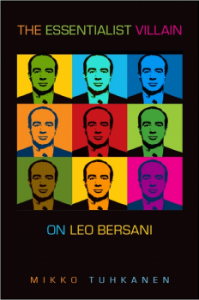 Mikko Tuhkanen. The Essentialist Villain: On Leo Bersani. SUNY Press, 2018.
Mikko Tuhkanen. The Essentialist Villain: On Leo Bersani. SUNY Press, 2018.
Since his first publications in the late 1950s, Leo Bersani’s work has influenced numerous scholarly fields, from studies of French modernism and realist fiction to psychoanalytic criticism and film theory. It has occasionally helped precipitate the emergence of new disciplinary fields, such as queer theory in the late 1980s. The Essentialist Villain is the first book-length study of this impressively rich oeuvre. Mikko Tuhkanen tracks the unfolding of Bersani’s onto-ethics/aesthetics, paying particular attention to his persistent references to “essence,” a concept central to classical speculative philosophy, which has fallen into distinct disfavor since the emergence of deconstructive thought. Because of his early influences—particularly Gilles Deleuze’s philosophy—Bersani remains an ontologist through decades when deconstruction seems to have all but disallowed any thought of being. Tuhkanen also locates Bersani’s thought amidst numerous literary, artistic, and philosophical interlocutors, including Deleuze, Freud, Proust, Laplanche, Beckett, Baudelaire, Genet, Leibniz, and others.
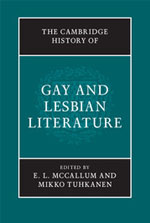 E. L. McCallum and Mikko Tuhkanen, eds. The Cambridge History of Gay and Lesbian Literature. Cambridge University Press, 2014
E. L. McCallum and Mikko Tuhkanen, eds. The Cambridge History of Gay and Lesbian Literature. Cambridge University Press, 2014
The Cambridge History of Gay and Lesbian Literature presents a global history of the field. It is an unprecedented summation of critical knowledge on gay and lesbian literature that also addresses the impact of gay and lesbian literature on cognate fields such as comparative literature and postcolonial studies. Covering subjects from Sappho and the Greeks to queer modernism, diasporic literatures, and responses to the AIDS crisis, this volume is grounded in current scholarship. It presents new critical approaches to gay and lesbian literature that will serve the needs of students and specialists alike.
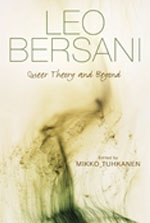 Mikko Tuhkanen, ed. Leo Bersani: Queer Theory and Beyond. SUNY Press 2014
Mikko Tuhkanen, ed. Leo Bersani: Queer Theory and Beyond. SUNY Press 2014
For more than fifty years, Leo Bersani’s writing has inspired and challenged scholars in the fields of literary criticism and theory, cultural studies, queer theory, psychoanalysis, and film and visual studies. This is the first book-length collection on this important author. The book’s extensive introduction outlines in detail Bersani’s oeuvre, particularly its place in queer thought and his complicated relationships with the fields of queer theory and psychoanalysis. The subsequent contributions by notable scholars in various fields demonstrate the richness and open-endedness of his work. The book concludes with a new interview with Bersani.
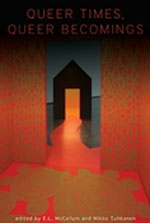 E. L. McCallum and Mikko Tuhkanen, eds. Queer Times, Queer Becomings. SUNY Press, 2011
E. L. McCallum and Mikko Tuhkanen, eds. Queer Times, Queer Becomings. SUNY Press, 2011
If queer theorists have agreed on anything, it is that for queer thought to have any specificity at all, it must be characterized by becoming, the constant breaking of habits. Queer Times, Queer Becomings explores queer articulations of time and becoming in literature, philosophy, film, and performance. Whether in the contexts of psychoanalysis, the nineteenth-century discourses of evolution and racial sciences, or the daily rhythms of contemporary, familially oriented communities, queerness has always been marked by a peculiar untimeliness, by a lack of proper orientation in terms of time as much as social norms.
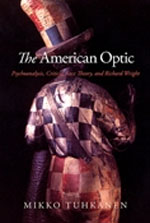 Mikko Tuhkanen. The American Optic: Psychoanalysis, Critical Race Theory, and Richard Wright. SUNY Press, 2009
Mikko Tuhkanen. The American Optic: Psychoanalysis, Critical Race Theory, and Richard Wright. SUNY Press, 2009
The American Optic charts new territory in the relationship of psychoanalysis to critical race studies. Focusing on the work of Richard Wright and Jacques Lacan, it explore the political and ethical implications of psychoanalysis for African American and other diasporic African cultural texts. Mikko Tuhkanen develops a theory of “racialization” that recasts the genealogy of the Western concept of racial difference as outlined by critical race theory, through the theory of the real, which Lacan developed in his later work.
Journal Articles (selected)
- “‘Dreaming of Some Vanished Relationship’: James Baldwin on Aesthetics and the Sacred,” PMLA (forthcoming)
- “Unbinding the Subject: James Baldwin on the Evil that Is in the World,” Twentieth-Century Literature (forthcoming)
- “Bigger’s Thing,” American Literary History (forthcoming)
- “Looking Together: Desiring Relations in James Baldwin,” diacritics: A Review of Contemporary Criticism (forthcoming)
- “Before,” Syntax of Thought: Reading Leo Bersani, ed. Jacques Khalip and John Paul Ricco, spec. issue of differences: A Journal of Feminist Cultural Studies 34.1 (2023): 35-41. DOI: 10.1215/10407391-10435506
- “Out There,” In the Moment, the blog of Critical Inquiry 18 Mar. 2022 (available at https://critinq.wordpress.com/2022/03/18/out-there/)
- “The Time of Whiteness: James Baldwin on How Lives Matter,” ASAP Journal 15 Dec. 2020.
- “The Most Fascinating Medium,” introduction to “Fascination and Cinema,” special issue of Postmodern Culture, ed. Mikko Tuhkanen 30.2 (Jan. 2020).
- “Accompanying Images: Leo Bersani and Cinematic Fascination,” in “Fascination and Cinema,” special issue of Postmodern Culture, ed. Mikko Tuhkanen 30.2 (Jan. 2020).
- “Leo Bersani’s Speculative Aesthetics,” Postmodern Culture 29.3 (May 2019).
- “Being Fascinated: Toward Blanchotian Film Theory,” rev. of Calum Watt, Blanchot and the Moving Image: Fascination and Spectatorship (2017), Postmodern Culture 29.2 (Jan. 2019).
- “Losing Real Life: James Baldwin and the Ethics of Trauma,” James Baldwin Review 4 (2018): 114-27.
- “A Passion for Sameness: Leo Bersani’s Ontology of Narcissism,” Cultural Critique 99 (Spring 2018): 125-49.
- “Grotesquely Becoming: Tarzan’s Queer Hominization,” diacritics 44.1 (2016): 28-58.
- “Watching Time: James Baldwin and Malcolm X,” James Baldwin Review 2 (2016): 97-125.
- “Homomonadology: Leo Bersani’s Essentialism,” differences: A Journal of Feminist Cultural Studies 25.2 (Summer 2014): 62-100.
- “Scattering Being: Leo Bersani and Diasporic Modernity,” CR: The Centennial Review 13.3 (2013): 53-88.
- “‘Mankind’s Queerest Laboratory’: Richard Wright and the Speed of Decolonization,” Obsidian III 11.2 (Fall/Winter 2010): 74-94.
- “Richard Wright’s Oneiropolitics,” American Literature 82.1 (March 2010): 151-79.
- “Performativity and Becoming,” Cultural Critique 72 (Spring 2009): 1-35.
- “Queer Guerrillas: On Richard Wright’s and Frantz Fanon’s Dissembling Revolutionaries,” Richard Wright Centennial Issue, ed. Jerry W. Ward, Jr., of Mississippi Quarterly 61.4 (Fall 2008): 615-42.
- “James Baldwin on the American Express and the Queer Underground,” English Language Notes 45.2 (Fall/Winter 2007): 123-31.
- “Ontology and Involution,” diacritics 35.3 (Fall 2005): 20-45. [Published in 2007]
- “‘Out of Joint’: Passing, Haunting, and the Time of Slavery in Hagar’s Daughter,” American Literature 79.2 (June 2007): 335-61.
- “Foucault’s Queer Virtualities,” Rhizomes 11/12 (Fall 2005/Spring 2006)
- “Danzig Time: Dissociative Camp and European Synchrony” (co-authored with Peter Rehberg), SQS: A Journal of Queer Studies in Finland (2007): 43-59.
- “Of Blackface and Paranoid Knowledge: Richard Wright, Jacques Lacan, and the Ambivalence of Black Minstrelsy,” diacritics 31.2 (Summer 2001): 9-34. [Published in 2003]
- “Breeding (and) Reading: Lesbian Knowledge, Eugenic Discipline, and The Children’s Hour,” Modern Fiction Studies 48.4 (Winter 2002): 1001-40.
- “Binding the Self: Baldwin, Freud, and the Narrative of Subjectivity,” GLQ: A Journal of Lesbian and Gay Studies 7.4 (Fall 2001): 553-91.
- “‘A [B]igger’s Place’: Lynching and Specularity in Richard Wright’s ‘Fire and Cloud’ and Native Son,” African American Review 33.1 (Spring 1999): 125-33.
Book Chapters (selected)
- “The Ripened Reverend: Ingmar Bergman and Paul Schrader,” A Companion to Ingmar Bergman, ed. Hamish Ford and Daniel Humphrey (Wiley Blackwell, forthcoming)
- “Baldwin and Psychoanalysis,” James Baldwin in Context, ed. D. Quentin Miller (Cambridge: Cambridge UP, 2019), 187-97.
- “Monadological Psychoanalysis: Bersani, Laplanche, Beckett,” Leo Bersani: Queer Theory and Beyond, ed. Tuhkanen (Albany: SUNY P, 2014), 141-65.
- “Rigorously Speculating: An Interview with Leo Bersani,” Leo Bersani: Queer Theory and Beyond, ed. Tuhkanen (Albany: SUNY P, 2014), 279-96.
- “Leo Bersani: Queer Theory and Beyond,” introduction, Leo Bersani: Queer Theory and Beyond, ed. Tuhkanen (Albany: SUNY P, 2014) 1-34.
- “Native Son and Diasporic Modernity,” The Oxford History of the Novel in English, vol. 6: The American Novel, 1870-1940, ed. Priscilla Wald and Michael A. Elliott (Oxford UP, 2014), 517-29.
- “Mestiza Metaphysics,” in Queer Times, Queer Becomings, ed. E. L. McCallum and Mikko Tuhkanen (Albany: SUNY P, 2011), 259-94.
- “The Look of the World: Richard Wright and the Art of Perspective,” A Companion to the American Short Story, ed. Alfred Bendixen and James Nagel (West Sussex, UK: Wiley-Blackwell, 2010), 316-27.
- “Queer Hybridity,” in Deleuze and Queer Theory, ed. Chrysanthi Nigianni and Merl Storr (Edinburgh: Edinburgh UP, 2009), 92-114.
